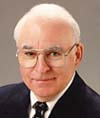Management Outlook 1999
Related Items
|
That should be good news for trucking, although it won’t guarantee a healthy year for all motor carriers, according to a panel of experts interviewed by Transport Topics.
Many companies will find it difficult to raise rates. Fuel prices, which are at a low ebb, may well go higher. Driver wages are certain to escalate, and shippers will continue to increase demands for more timely and less expensive transportation solutions.
Beneath the surface also lie some explosive political issues, such as hours-of-service reform, which could have far-reaching impact on the fundamental economics of the industry.
To provide a glimpse of what’s to come, we spoke with investment analyst Thom S. Albrecht of ABN AMRO Inc.; Charles Lounsbury, the new president of Skyway Freight System; Edward M. Emmett, president of the nation’s largest shipper organization; and Edward Wytkind, executive director of the Transportation Trades Department of the AFL-CIO.
 Thom S. Albrecht ABN AMRO Inc. |
Slower growth early in the year may expedite consolidation trends and ease driver shortages a bit, he said.
Mr. Emmett sounds a bit laconic about the economy, but at least he’s not predicting disaster. “There
re a lot of people who think the economy going flat is a disaster,” he noted.
 Edward M. Emmett NITLeague /td> |
When people my age start retiring and start pulling money out of the market and doing some other things, then I think that will get to be a very interesting time.”
Sales of heavy duty trucks will likely be around 180,000 to 190,000 units, down from what is expected to be banner sales of 210,000 units in 1998. “It would still be one of the strongest years on record,” Mr. Albrecht noted.
Truck sales commanded much attention from Wall Street this past year because of the possibility that too many new trucks would result in freight hauling overcapacity and lower rates. Mr. Albrecht’s analysis helped calm investors’ fears by showing that much of the demand for new trucks was coming from fleets that were replacing older vehicles rather than expanding their fleets.
These trends will continue in 1999. “We probably won’t see quite as many less-than-truckload orders,” Mr. Albrecht said. “If the economy slows, as we think it might, those folks will probably go back to maintaining older equipment.”
Truckload carriers are not expected to change their equipment plans very much, he noted. Healthy carriers will continue to expand while marginal fleets will put off buying equipment as their financial conditions deteriorate.
Vocational and government equipment purchases are expected to remain healthy, however, reflecting strong construction and industrial markets and increasing federal and state budget surpluses, Mr. Albrecht said.
There are certainly some clouds in the picture, according to other panel members.
 Charles Lounsbury Skyway Freight |
Employment, Mr. Emmett said, “has been a deceptive figure because it keeps showing very low unemployment. The way jobs are being created is spotty and I think there are a lot of people who are currently underemployed.”
For Mr. Emmett, and for the AFL-CIO’s Mr. Wytkind, the biggest transportation issues in 1999 have little to do with the economy.
“Our goal for 1999 is to fend off what we think are very direct assaults on safety,” said Mr. Wytkind, who is expected to lead a spirited fight by organized labor against changes in hours-of-service rules for truck drivers and push for installation of collision avoidance systems on all cargo aircraft.
“While we don’t have a formal list of policy objectives, we intend to advance a very pro-safety agenda across the board,” he said. “We think there are ways to improve the safety of every mode of transportation, and it needs to be done now.”
One of the issues that will likely divide labor and management is the development of ergonomics standards.
“A lot of trucking interests have been up front trying to kill ergonomics standards, which we don’t understand,” Mr. Wytkind said. “I have too many personal friends, and we have too many members in the labor movement, who are experiencing problems — physical, debilitating problems —that have a direct relationship to ergonomics issues. It’s appalling to me that that’s where this debate has gone. From my perspective, ergonomics issues are real. They ought to be dealt with, and the trucking industry ought to stop being a stalking horse for efforts to kill ergonomics reform.”
On possible changes in hours-of-service rules, Mr. Wytkind said the AFL-CIO won’t necessarily try to preserve the status quo.
 Edward Wytkind AFL-CIO |
The industry leaders also discussed labor, shipping, the Office of Motor Carriers and railroads; for the full story, see the Dec. 7 print edition of Transport Topics. Subscribe today.


